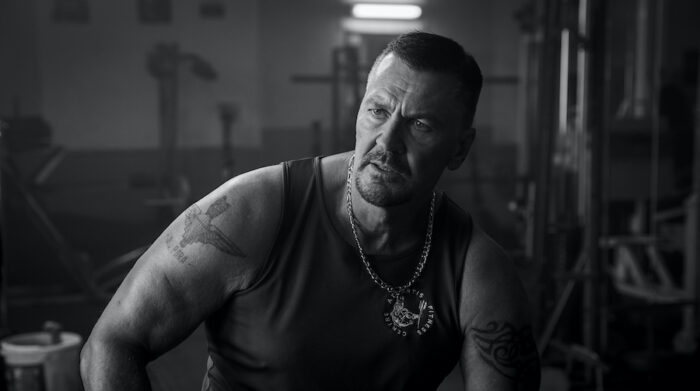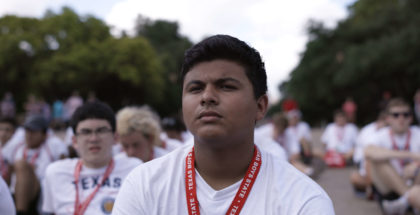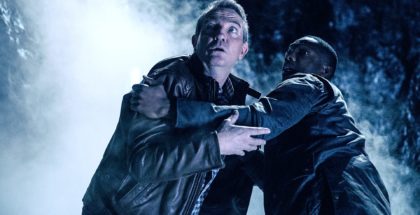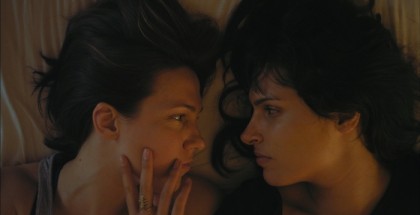Muscle review: An intense study of injured masculinity

Review Overview
Clerkin and Fairbrass's double act
9Messy masculinity in monochrome
9The Style, The Suspense, The The
9Rating
Anton Bitel | On 04, Dec 2020
Director: Gerard Johnson
Cast: Cavan Clerkin, Craig Fairbrass, Polly Maberly, Lorraine Burroughs, Mark Stobbart, Peter Ferdinando
Certificate: 18
“Can you judge a man by the way he wears his hair? Can you read his mind by the clothes he wears? Can you see a bad man by the pattern on his tie?”
By opening with these lyrics from Manfred Mann Chapter Three’s 1969 cover of Mister You’re A Better Man Than I, while introducing Simon (Cavan Clark) – a lonely, isolated man with a receding hairline, middle-aged paunch and sad-sack demeanour – Muscle clearly announces itself as a film about the mysteries of manhood.
Shooting in a stark black and white, cinematographer Stuart Bentley tracks Simon’s every movement, as he heads into the Newcastle call centre that is his workplace and fails to close a pitch, and then returns home where his girlfriend, Sarah (Polly Maberley), does not seem overly happy to see him and is certainly not up for sex. Hangdog, emasculated and pathetic, Simon knows he needs to change his life – and so, on a whim, he commits to training at an old-school gym that he passes every day on the walk to work.
There Simon meets Terry (Crag Fairbrass), a tough-talking, self-assured, ex-army, ex-con hard man who is both the exact opposite of Simon and everything that he would like to become. After Terry pitches himself as a personal trainer – in much the same way that Simon pushes sales at the call centre – Simon finds himself with an exercise (and life) coach. In this all-male milieu of body building, the beer-bellied loser shaves his head, grows a beard, and – under Terry’s close tutelage – starts acquiring muscle and confidence, even as he becomes more successful at work.
When Sarah leaves Simon, Terry moves in – and as the two men get closer in their training routines, their orgiastic parties in the house and in Terry’s obviously dodgy business ventures, Simon starts wondering what kind of person he is becoming, and whether Terry is taking him for a ride.
“Don’t be a fucking wimp,” says Terry. “You won’t even feel it, you won’t even notice it – it’s like a little prick.” Simon is being persuaded, against his will, to let Terry inject some anabolic steroids into his backside. These steroids, and the aggression which they bring to Simon, will make him lose his job – but more important are the homoerotic underpinnings of this scene, with Terry’s downward spiral framed as a seduction (Terry refers to the steroids as “man juice”). Later, in a film full of pumping bodies and exposed flesh, this eroticisation will shift from the metaphorical to the literal, in increasingly sexualised scenes that come to maximise Simon’s confusion and discomfort over what he really wants.
Muscle fits right in with writer/director Gerard Johnson’s previous run of features (Tony, 2009; Hyena, 2014), all concerned with masculinity in crisis. At first its narrative follows a trajectory lifted straight from a Charles Atlas advertising campaign, as we witness Simon’s transformation from mild-mannered milquetoast to swaggering, cocky strongman. Yet along with this metamorphosis comes an interrogation – indeed, a self-interrogation – of identity, as Simon finds all his psychological and sexual needs reflected in Terry, and stops liking what he sees in the mirror.
The obvious reference points for this intense, transformative relationship of toxic masculinity are Shinya Tsukamoto’s Tokyo Fist and David Fincher’s Fight Club – and it is left uncertain where exactly Terry’s reality ends and Simon’s fantasy begins. The filmmaking is taut and tense, the score by The The is a disorienting soundscape of blippy dysphoria, and the two central performances are mesmerising embodiments of damaged (and damaging) machismo, as Johnson takes us on a sweaty, hallucinatory trip through the male persona in panic. All that remains is to judge Simon as a man – for who he is, for what he has done, and for what deep down he wishes he could be.
Related Posts
Apple TV+ film review: Boys State August 14, 2020 | Ivan Radford

Netflix UK film review: Sand Storm February 3, 2019 | David Farnor

UK TV review: Doctor Who Season 11, Episode 9 (It Takes You Away)... December 2, 2018 | Mark Harrison

VOD film review: Appropriate Behaviour June 23, 2015 | Simon Kinnear















